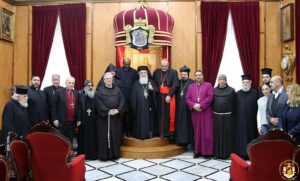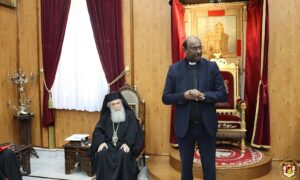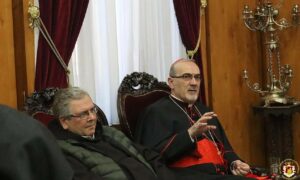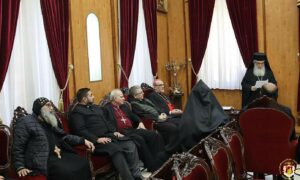VISIT OF THE GENERAL SECRETARY OF THE WORLD COUNCIL OF CHURCHES TO THE PATRIARCHATE
On Saturday, February 17, His Beatitude Patriarch Theophilos III, Patriarch of the Holy City, welcomed Dr Jerry Pillay, the general secretary of the World Council of Churches (WCC), at the Jerusalem Patriarchate’s headquarters. The meeting was attended by the Heads of Churches in Jerusalem, including; Cardenal Pierbattista Pizzaballa, Latin Patriarch in Jerusalem; Fr. Francesco Patton, Custodian of the Holy Land; Archbishop Hosam Naoum, Head of the Episcopal Church in Jerusalem, and representatives from the Armenian Patriarchate and the Coptic Church in Jerusalem.
The visit of the General Secretary comes during difficult times the Holy Land is going through, therefore Dr Pillay expressed his commitment to ask the millions of Christians, who are members of the Council worldwide, to increase their prayers and support to the churches and the people in the Holy Land, and for peace and reconciliation amid the tension between the different sides.
In recognition of his support, His Beatitude honoured the General Secretary with the medal of the Commander of the Order of the Knights of the Holy Sepulchre.
In addition, the Church leaders each took the opportunity to present the General Secretary with the difficulties and challenges facing Christians, churches and their properties, i.e. the Mount of Olives and Gethsemane, that are often affected by the improper actions of radical elements.
During the meeting, His Beatitude took the opportunity to address Dr Pillay on behalf of the church leaders as follows:
“Dr Pillay,
Beloved Members of your Delegation,
Sisters and Brothers in Christ,We welcome you warmly to the Holy City of Jerusalem and to our Patriarchate, and we wish to express our gratitude to you for your visit at this difficult and complicated time for all the peoples of this region, and especially for the Christian community of the Holy Land.
Your visit is of such importance, for you bring with you the attention of the World Council of Churches and its members to the situation here.
In these critical times, we Christians, both in the Holy Land and around the world, have a mission to uphold the message of the Gospel, which is stronger and more enduring than our human weakness. It is the Gospel that speaks of reconciliation and peace, and this must be our constant commitment. War and violence are always the consequence of human failure. But Christ and his Church proclaim a different truth. In theological terms we affirm that hatred and darkness have no hypostasis; it is only light and life that have a true and enduring existence.
Death is not our mission. God-given life is at the heart of the kerygma of the Gospel. As our Lord Jesus Christ tells us, I came that they may have life and have it in all its fulness (John 10:10). We are called to be united in our moral obligation and mission to uphold the sacred values of peace and reconciliation. As we learn from the Prophet Isaiah,
They shall beat their swords into plowshares
and their spears into pruning hooks;
nation shall not lift up sword against nation;
neither shall they learn war any more.(Is. 2:4)
This is our common human vocation and our common human destiny. The call of the Gospel is to turn the instruments of war into the instruments of peace and reconciliation.
Our historical experience in the Holy Land is a powerful and tangible example that synagogue, church, and mosque may exist side by side in mutual respect. Ours is a long-standing multi-cultural, multi-ethnic, multi-religious landscape which has given rise to a unique civilization, in which Jerusalem remains the beacon of hope for the whole world. There has always been room in the Holy Land for all those who call this region our home.
There is no military solution to establish the future of the Holy Land and the wider Middle East. The pattern of disputes, retribution, and retaliation has brought us no nearer to peace and security, and all these frames of reference are bankrupt. For it is written, Do not be overcome by evil, but overcome evil with good (Rom. 12:21).
With this in mind, we as the Heads of Churches in the Holy Land continue to pray and call for an end to the war so that the humanitarian crisis may be brought to an end, displaced populations may return to their homes, and essential help be brought to all innocent victims caught up in this conflict who are without the basic necessities of life.
The present conflict is clear evidence from which we have learnt that that we must face the future with a new resolve. We believe that this is the only way to forge a new pathway to true and lasting peace and reconciliation.
The Heads of the Churches remain firm in our opposition to the escalation of violence. We are convinced, as is the World Council of Churches, that it is in upholding and promoting the fundamental values of the Gospel that a way forward will be found, and we invite our fellow Christians, as well as all people of good will around, to join us in this sacred mission. For it is written, Blessed are the peacemakers, for they will be called children of God (Mt 5:9).
As you come to the Holy Land as pilgrims of peace in a time of war, we pray that our risen Lord, the conqueror of death, may bless your work and your endeavours in the cause of the Gospel of peace and reconciliation.
Thank You.”



